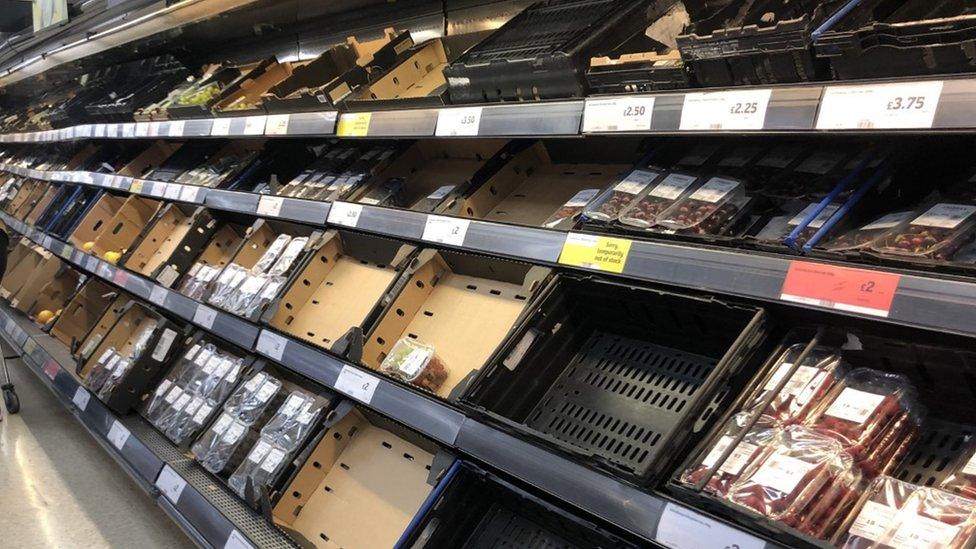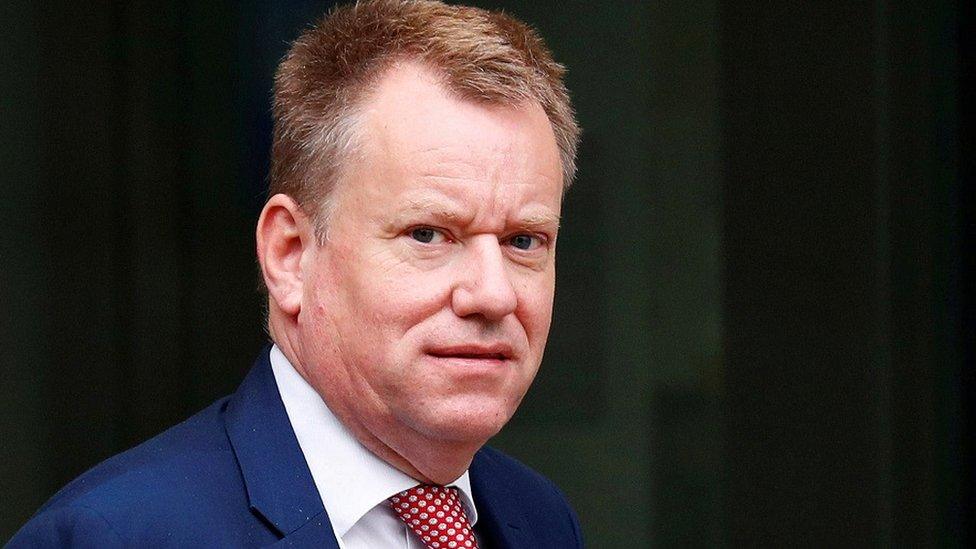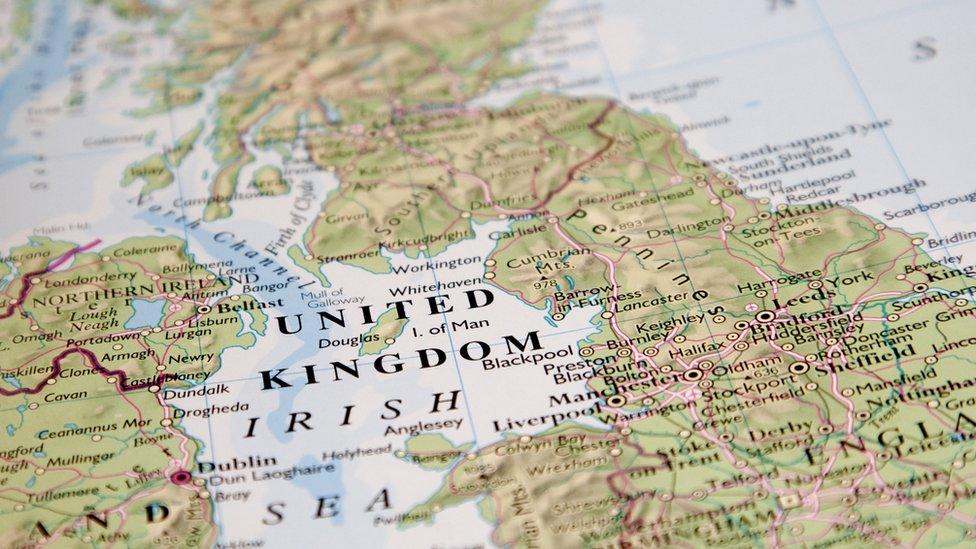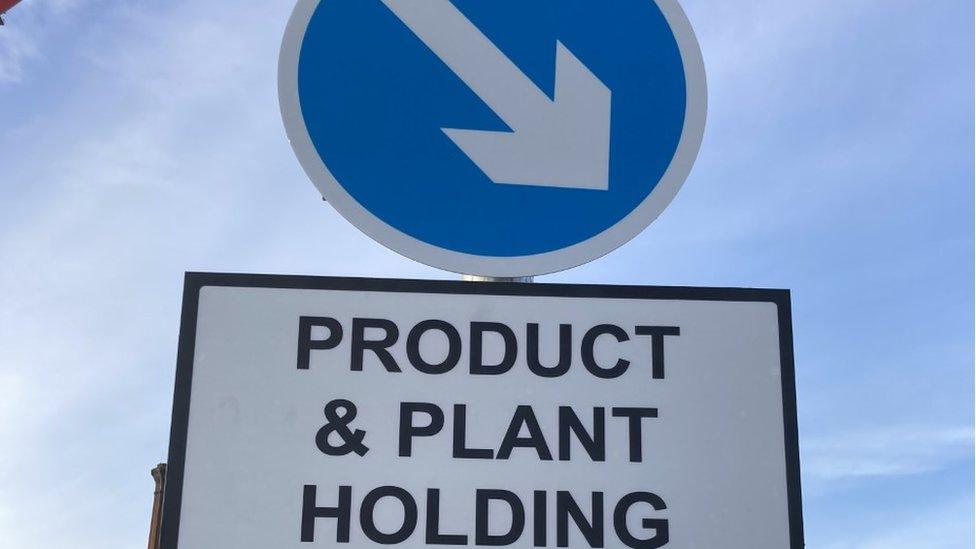Brexit: UK acted prevent empty shelves, says Brandon Lewis
- Published
- comments

Some supermarkets reported supply problems when new rules came into force on 1 January
There would have been empty shelves in Northern Ireland supermarkets if grace periods on Brexit checks had not been extended, the NI secretary has said.
Brandon Lewis was answering questions about the UK government's unilateral decision to extend grace periods on goods going from Great Britain to NI.
The EU has complained this unilateral action breached part of the Brexit deal known as the Northern Ireland Protocol.
Mr Lewis insisted the move was "lawful" in response to criticism from MPs.
The government is facing a threat of legal action from the EU over the alleged breach of the Northern Ireland Protocol agreement on post-Brexit goods checks.
The issue was also raised in the House of Lords, where the UK's new Brexit Minister, Lord Frost, said London will defend "vigorously" any legal action brought by Brussels.
Lord Frost also said the operation of the Northern Ireland Protocol needs to have the "confidence" of both communities.
He added the "protocol is explicit in respecting the territorial integrity of the UK and we will ensure that is sustained".

Lord Frost said London will defend "vigorously" any legal action brought by Brussels
Lord Frost also denied the government had acted last week without first informing the EU.
He told peers the measures taken were "operational, technical and temporary" and confirmed they had informed the EU commission before the decision on the grace period extensions was made public.
The Labour Party has also accused the government of breaking international law and the issue was raised in the House of Commons on Wednesday by Shadow Northern Ireland Secretary Louise Haigh.
In an urgent question, she asked if it was the government's intention to "push the protocol to breaking point" by taking its own decisions on goods checks without the agreement of the EU.
"This is an extraordinary position for a government to be in - having to break the law and trash Britain's international reputation to remove checks they claimed never existed," Ms Haigh said.
Prior to Brexit, Prime Minister Boris Johnson had promised there would not be any tariffs or checks on goods arriving in NI from GB, in cases where those goods were not destined for the Republic of Ireland.
However, in order to prevent new goods checks along a so-called hard land border on the island of Ireland after Brexit, the UK and EU negotiated the Northern Ireland Protocol.
The protocol means Northern Ireland must apply the EU's single market rules at its ports, which involves inspecting certain goods arriving from Great Britain, where single market rules no longer apply.

The end of the Brexit transition period saw new goods checks at NI ports
These port checks effectively created a trade border in the Irish Sea, which is strongly opposed by unionists.
Some checks began on 1 January 2021 - the end of the Brexit transition period - but inspections are being phased in gradually to give businesses time to adjust to new processes and paperwork.
The first of these periods was to expire at the end of March but last week the UK government announced it would extend this timeframe until October, prompting a threat of EU legal action.

NI Secretary Brandon Lewis announced the extensions last week
"My view is having spoken to businesses, if we hadn't have taken the action that we took last week, we would have had empty shelves in supermarkets in Northern Ireland imminently now," Mr Lewis told the House of Commons on Wednesday.
He added: "I think that would have raised tensions further and it may well have undermined the protocol fatally in a way that is not actually in the best interests of either the EU, the UK or the people of Northern Ireland."
During the exchanges, the chairman of the Northern Ireland Affairs Committee Simon Hoare said UK unilateral action had a "very destabilising effect on trust" in relations with the EU and Ireland.
The Conservative MP said the protocol could benefit Northern Ireland significantly and urged the government to "make sure that the protocol works, that everybody understands that it's here to stay".
However, fellow Tory MP Sir Bernard Jenkin said: "The idea that the Northern Ireland Protocol is a work of such perfection, it is beyond improvement, is a myth."
Sir Jeffrey Donaldson from the Democratic Unionist Party (DUP), which has opposed the protocol since it was agreed in 2019, told the Commons: "What we need is a permanent solution to this problem and frankly the sooner the better."
When checks began in January, Mr Lewis initially said there was "no Irish Sea Border" and that the government had made preparations that were "keeping goods flowing freely".
Allow X content?
This article contains content provided by X. We ask for your permission before anything is loaded, as they may be using cookies and other technologies. You may want to read X’s cookie policy, external and privacy policy, external before accepting. To view this content choose ‘accept and continue’.
But on Wednesday, he told the Commons he had spent a lot of time over the past few weeks talking to businesses who had warned of disruption to food supplies if grace periods were not extended.
"The measures I announced last Wednesday are lawful, they are consistent with the implementation of good faith protocol, they're temporary operational easements introduced where additional delivery time is needed," Mr Lewis said.
"They don't change our legal obligations set out in the protocol and we continue to discuss these in the joint committee."
"We would have liked to have been able to get this agreement with the EU - sadly that wasn't possible within the timeframe in which we had to make the decisions to ensure the people of Northern Ireland would not suffer a loss of trade and loss of flow of products."
Related topics
- Published2 February 2024

- Published6 February 2021

- Published23 December 2020
